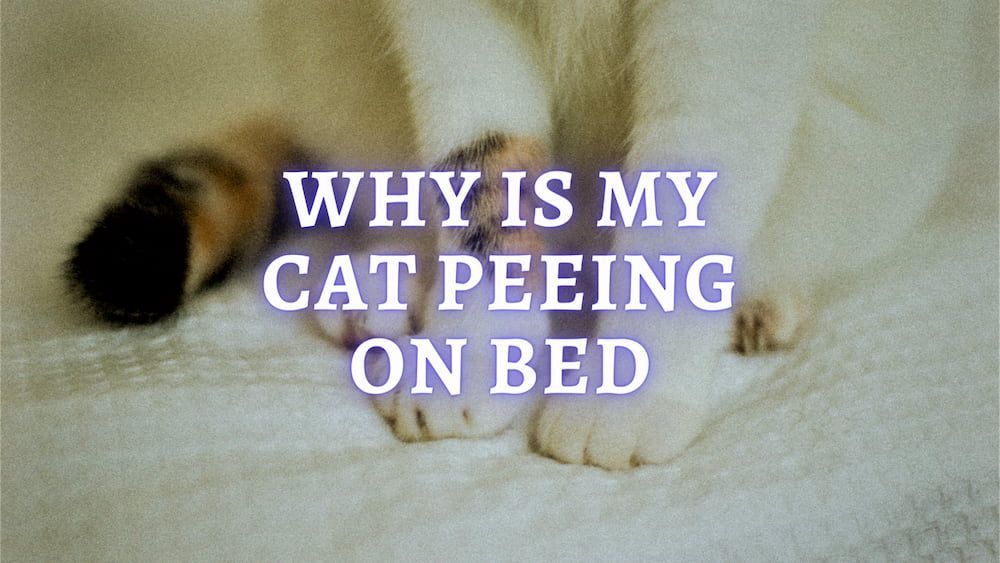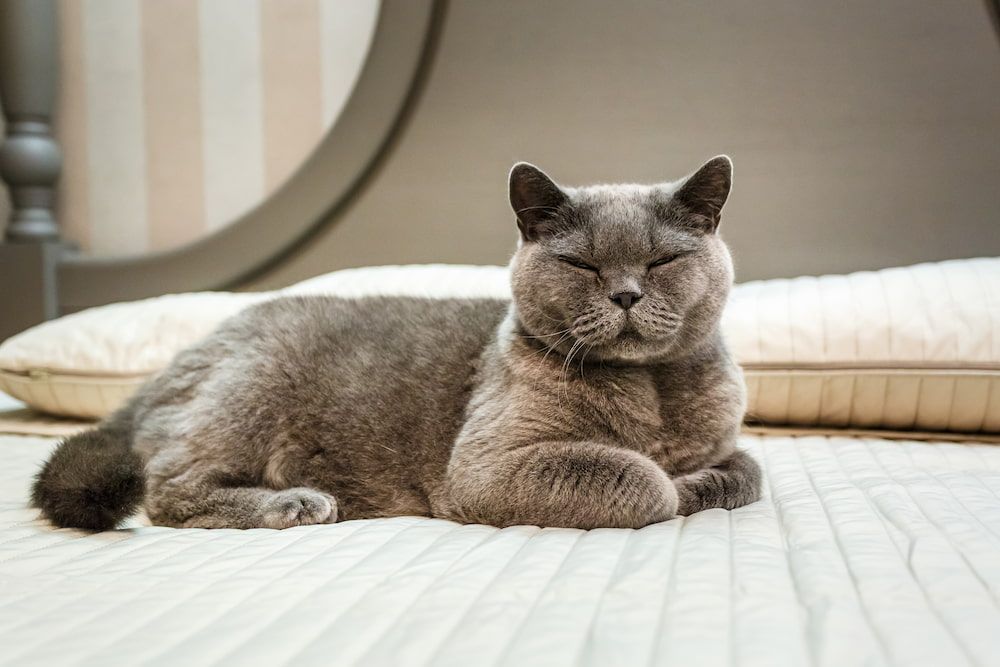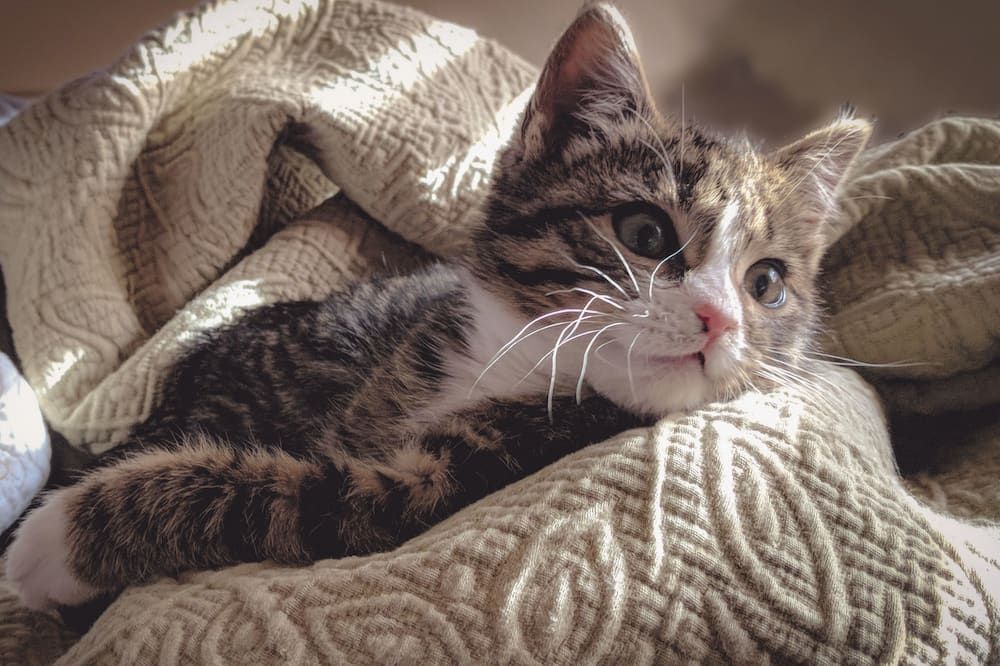Cat Peeing On Bed: Why Your Cat is Peeing on the Bed and How to Stop It?
Written by:
Author: Scott Jeffrey
Scott is a professional blogger with 12+ years of experience in writing, and holds an MA in anthropology. He has two cats as housemates. Also, Scott is passionate to research on pet-related topics such as dog training, puppy feeding, and cat health.
View all 63 articlesLearn about our editorial process and veterinary review board.
Viewed: 564
Updated on: 12/14/2022
It can often be challenging to explain feline behavior, and house training a cat can sometimes take time. If you have a cat urinating on your bed, it’s important to examine why this may be happening so that you can take steps to stop it.
This problem is quite common; even cats that have been house trained for years can experience problems with urination on the bed. If you are confused about the behavior and you would like to identify the cause as well as put a stop to it, then you have come to the right place. Here is everything that you need to know about why cats urinate on beds and how you can stop them from doing so.
There are a few reasons why your cat might be urinating on your bed. The most common reason comes down to change or stress.
RELATED: How to Stop Cat From Pooping Outside the Litter Box
The main reasons your cat pees on the bed:
1. Issues with the Litter box
If the litter box is not clean, your cat may refuse to use it and instead urinate on your bed. The surface of your bed might seem like a fine substitute for the litter box if the litter box is not clean enough for your cat’s liking. The cat litter you choose needs to be high quality and if you have a multi-cat household, you need to ensure you have multiple litter boxes. Having a few cat box areas will give your pets their own space and cut down on dirty litter boxes.
We would recommend cleaning out the litter box at least once a day and if your cat is continuing to urinate on the bed or if you have multiple kitties, you might want to consider a second litter box. Having a clean litter box is the key to preventing your feline friend from urinating on the bed. Standard clumping litter or upgrading from one litter box can prevent cat peeing on items in your home.
The litter box’s location can also play a role in making cats urinate outside of the litter. If you notice a cat peeing on your bed or they spend time away from the new litter box, you may want to consider a different litter box location.
READ MORE: How Many Litter Boxes Should Be in a Multi-Cat House?
2. Marking the territory
Felines start to mark their territory by urinating and this can be done for a number of reasons. If your kitty feels like its territory is threatened, it may start to urinate on your bed as a way of warding off potential rivals. If your cat usually sleeps on the bed or considers the bedroom to be their territory, they will mark this area to stop others from invading their space.
You can prevent your cat from peeing on the bed by making sure that their territory is not threatened. If you have another pet, try to keep them out of the bedroom so that your cat does not feel like its territory is being invaded. You should also make sure to clean any areas where your cat has urinated so that they are not encouraged to urinate in that spot again.
Cats will also often mark their territory when they are unspayed or not neutered. If your kitty is not spayed or neutered, this may be the reason why they are urinating on your bed. We recommend getting your kitty spayed or neutered as this will help stop them from urinating on your bed and across areas of the house. Owners that notice their cat’s behavior changing as they get older may notice these unwanted behaviors starting as they age.
3. Medical issues
If your cat is urinating on the bed, it could be a sign of a medical condition such as a UTI or kidney infection. If your cat is squatting to urinate and making a straining noise, it is important to take them to the vet as soon as possible because frequent peeing could be a sign of a serious medical issue.
With a UTI or kidney infection, your cat will likely be straining to urinate or frequently urinating across the house and in your bed. If you think your cat may have a UTI or kidney infection, it is crucial to take them to the vet as soon as possible so they can be treated. Ongoing Kidney disease may also make cats pee on your bed or ensure cats pee more frequently. Kidney disease can also lead to bladder stones, kidney stones, and pain as your cat is urinating. Examining these medical issues and exploring the underlying medical condition is important to prevent this annoying habit.
Diabetes could also be a potential medical reason for urinating on the bed. If your kitty is urinating more often than usual or if you notice any other changes in their behavior, it is important to take them to the vet to rule out any medical conditions.
4. Stress
Cats can often become stressed for a number of reasons such as moving, or the arrival of a new baby or pet, or even changes in routine. When cats are stressed, they may start to urinate outside of the litter box as a way of coping with the anxiety.
If you think your cat is peeing on the bed due to stress, there are a few things that you can do to help them:
- try to keep their routine as consistent as possible;
- if you have recently moved house, try to create a safe space for them in the new house
You can also try using a Feliway diffuser which emits calming pheromones and may help to calm your cat and stop them from feeling stressed. Calming treats or calming aids like the diffuser will keep your cat in pleasant surroundings.
5. Your cat is experiencing boredom and is acting out:
If your cat is bored, it may start acting out to get attention. This could include urinating on the bed or other areas of the house.
If you think your kitty is peeing on the bed due to boredom, there are a few things that you can do to help them. Try to create a more stimulating environment for them with toys and climbing shelves. You can also try to spend more time playing with them so that they are not bored. When cats are not regularly stimulated and have also grown used to the behavior of you regularly playing with them, there is a chance they may act out so that you will play with them again or notice them.
READ MORE: How Often Do Cats Poop
How to stop your cat from peeing on the bed:
Depending on the reason you think your cat is peeing on the bed, there are a few different things that you can do to stop them from doing so.
If your cat is urinating on the bed as a result of stress, maintain their routine as consistent as possible, and if you’ve recently relocated, try to establish a secure place in your new home. You may also utilize a Feliway diffuser, which releases soothing pheromones and may aid in lowering your pet’s stress levels.
If your kitty is urinating on the bed as an act of boredom, provide them with toys, climbing shelves, or more time playing with them to make their environment more entertaining.
Suppose you believe your cat has a UTI or kidney infection and is urinating on the bed. In that case, it’s critical to visit the veterinarian as soon as possible so they can be treated. A urinary tract infection requires a visit to the vet immediately as antibiotics can treat your pet and prevent them from peeing on your bed.
In general, working to keep your pet’s litter box clean is critical since a dirty litter box may be one of the reasons why cats begin to urinate out of the litter box. Try to clean out the litter box once a day with regular scooping and completely empty it every week.
RELATED: Why Did My Cat Poop on the Bed?
How to get the smell of cat pee out of your bed:
If your kitty has already urinated on your bed, there are a few things that you can do to try and remove the smell.
First, you will want to clean the area with a pet-safe cleaner or enzyme cleaner, which will help break down the urine and remove the smell. Make sure to dab the area with a clean cloth and not rub, as this will only spread the urine.
Once the area is clean, you can try using a natural odor eliminator such as baking soda or vinegar. Sprinkle the baking soda or vinegar on the area and let it sit for a few hours before vacuuming it up.
Once the area is cleaned, you can try using a dehumidifier to help remove any remaining moisture and smell.
If the smell persists, you may need to replace the mattress or bedding.
FAQ
Is there a breed of cats that’s more prone to urinating on the bed?
No, any breed of cat can urinate on the bed. However, males are more likely to spray urine to mark their territory.
Should I punish my cat for urinating on the bed?
Negative reinforcement such as punishment is not an effective way to stop your pet from urinating on the bed. In fact, it may only make the problem worse as your cat could become even more stressed.
I have multiple cats. How can I tell which of my cats is peeing on the bed?
If you have several cats, it may be challenging to figure out which one is urinating on the bed. One way to try and narrow it down is to see if there is a cat that seems to be spending more time in the room where the bed is located. You can also try using a black light to see if there are any urine stains on the bed that are not visible to the naked eye. You could also consider watching your cats to see if you can catch them in the act or posting a webcam or smartphone in the room to see if you can identify the culprit that way.
How often should I clean my cat’s litter box?
You should scoop out your cat’s litter box at least once a day and make an effort to empty it fully every week.
 Cat Care How to Get an Aggressive Cat Into a Carrier? 6 Methods to Get a Cat Into a Carrier
Cat Care How to Get an Aggressive Cat Into a Carrier? 6 Methods to Get a Cat Into a Carrier - 1089
- 0
 Cat Care How High Can Cats Jump? All You Wanted to Know About Cats Jumping Abilities
Cat Care How High Can Cats Jump? All You Wanted to Know About Cats Jumping Abilities - 255
- 0
 Cat Care Can Cats Get Kennel Cough? Symptoms, Treatment and Prevention (Vet Approved)
Cat Care Can Cats Get Kennel Cough? Symptoms, Treatment and Prevention (Vet Approved) - 45
- 0
 Cat Care Why Does My Cat Attack My Legs? 10 Reasons Why and What To Do About It (Vet-Approved Advice)
Cat Care Why Does My Cat Attack My Legs? 10 Reasons Why and What To Do About It (Vet-Approved Advice) - 45084
- 21
 Cat Veterinary Tips Cat Stomach Gurgling: Vet Advice on Why is Your Cat Stomach Gurgling?
Cat Veterinary Tips Cat Stomach Gurgling: Vet Advice on Why is Your Cat Stomach Gurgling? - 33735
- 4
 Cat Veterinary Tips My Cat Lost its Voice: Can Cats get Laryngitis? (Vet Advice)
Cat Veterinary Tips My Cat Lost its Voice: Can Cats get Laryngitis? (Vet Advice) - 22891
- 13























